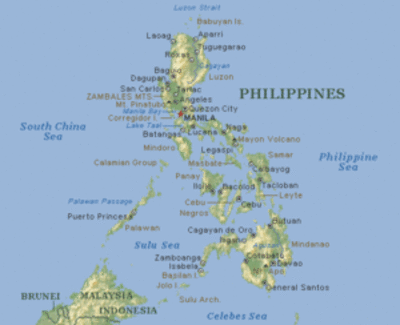by B.J. Stolbov
[Author's Note: Typhoon Yolanda, also known by its international name of Typhoon Haiyan, hit the Philippines on November 7, 2013. In honor of the dead and missing, I will use its Filipino name, Yolanda.]
The Philippines are surprisingly long. They may look like just a bunch of specks (7107 islands) at the end of the Pacific Ocean, but from the Batanes Islands beyond the end of Luzon Island in the north to the Tawi-Tawi Islands at the end of Mindanao Island in the south, the Philippines are long (1,150 mi.). They are almost as long as west coast of the U.S. from Seattle to San Diego (1,293 mi.). Because of its length, its many islands, and its moving ocean currents, the weather can change considerably from island to island, even from the exposed windward side to the more protected leeward side of any island.
Here, in Northern Luzon, we are protected from typhoons by the mountains. For a typhoon to hit us directly, it has to come in from the southeast, low off the water, through the beaches and lowlands of Aurora, then up the Cagayan Valley, and then into the hills and mountains. This is what we call a "low" typhoon.
Typhoon Labuyo, “the storm of the year” at that time, hit us on August 12 in Quirino. It came in “low,” knocked down all the corn, just before harvest; and all the bananas, which will grow back on their own in nine months. It flooded all the rice paddies, but rice is used to water. Lots of crops and houses were destroyed, but, thankfully, no deaths.

















